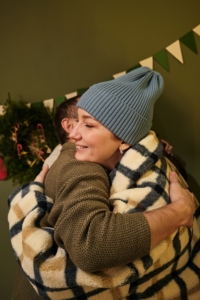 Home for the holidays? Do you dread the holidays? Is your family putting expectations on you that you don’t want to meet? Are there family members who seem to say something mean to you every time you see them? Does the thought of seeing family put you into an anxious depression? Do you suspect you may have unresolved childhood trauma?
Home for the holidays? Do you dread the holidays? Is your family putting expectations on you that you don’t want to meet? Are there family members who seem to say something mean to you every time you see them? Does the thought of seeing family put you into an anxious depression? Do you suspect you may have unresolved childhood trauma?
If you’ve answered yes to any of these questions you could be suffering from trauma caused by your family. Your emotions are responding to the threat of being traumatized again by family members that you are about to spend time with. Childhood trauma does affect your ability to spend time with your family and enjoy the holidays.
Why does being around my family make me feel so terrible?
The answer to this question is found in the way you learn and how your brain stores memory. Trauma is stored in intrinsic memory, which is subconscious. A clear example of how and what we store information in our intrinsic memory is riding a bike.
Do you remember the last time you rode a bike? How long has it been? If you got on a bike now could you hold your balance? It doesn’t matter how long it has been since you have ridden a bike, you still remember how to balance. Even if you don’t remember when or how you learned to ride, it’s almost impossible to unlearn how.
If you take a minute to think about it, our subconscious is amazing. You remember how to balance because the balance that you learn when riding a bike has been stored in your intrinsic memory. You have access to subconscious memories you are not aware of. It just happens automatically.
The same thing happens with childhood trauma. The trauma that you received from any of your family members, through verbal, emotional, or physical abuse is encoded in your subconscious. The feelings of anxiety, depression, or danger are accessed each time you are in the proximity of those who have traumatized you.
The subliminal messages that have been encoded in your intrinsic memory can include feelings of inferiority, failure, or unworthiness, to name a few. You may not be able to put your finger on where these messages came from, or what they are saying, you just know you feel terrible when you are around these people. This is because you started encoding these messages at an early age.
Now that you are older, you may have accomplished many things in life. You may have a good job and a family of your own. However, you find that childhood trauma makes it difficult for you to see yourself differently from how your family makes you feel. This may be the cause of that anxious depression and confusion you feel when you are around your family. This can be especially confusing for you if you were raised in a Christian home.
What we have learned so far about childhood trauma.
 Intrinsic memory is stored in the subconscious.
Intrinsic memory is stored in the subconscious.
This means you may not remember how you learned to feel the way you do, and you don’t have control over the feelings that accompany the trauma.
Intrinsic memory keeps us from learning from current experiences.
This means that no matter how many successes you have in life, or how good you feel around your friends, it doesn’t translate to family events.
Intrinsic memory is strongly linked to our emotions.
I’ve heard it said that emotions aren’t good decision-makers. However, if your emotions are telling you to stay away from your family maybe you should listen. Perhaps your family members aren’t safe to be around even if they are Christians. Learning to understand your inner voice is important to encoding new learning.
What does the Bible say about this?
You may be wondering if declining to attend your family’s Christmas celebration is caused by your unforgiveness or childish emotions. This can feel complicated if you were raised in a Christian family. Aren’t Christians supposed to forgive? First I’m letting you know that this has nothing to do with forgiveness. It has to do with respect.
Fortunately, John, the disciple of Christ, experienced a similar situation. Let us look at what he wrote and how it may be similar to what you are facing this Christmas season.
The elder, To my dear friend Gaius, whom I love in the truth. Dear friend, I pray that you may enjoy good health and that all may go well with you, even as your soul is getting along well. – 3 John 1-2, NIV
Notice the attention given to the care of your soul. John was concerned that his friend’s soul was cared for. Often when we are in the presence of our family members, our soul aches and doesn’t feel cared for.
It gave me great joy when some believers came and testified about your faithfulness to the truth, telling how you continue to walk in it. I have no greater joy than to hear that my children are walking in the truth. – 3 John 3-4, NIV
Now John is saying that there is no greater joy than truth. Often our family members are emotionally dishonest. If you are spending time with someone who has narcissistic tendencies, you are spending time with someone who is untruthful.
I wrote to the church, but Diotrephes, who loves to be first, will not welcome us. So when I come, I will call attention to what he is doing, spreading malicious nonsense about us. Not satisfied with that, he even refuses to welcome other believers. He also stops those who want to do so and puts them out of the church. – 3 John 9-10, NIV
John is clearly describing a narcissist. This person professes to be a Christian and holds a prominent position in the church. You may be thinking, “Christians can be narcissistic?” To make it more confusing for you this person Diotrephes holds himself in higher esteem than he does John, the disciple of Christ!
Dear friend, do not imitate what is evil but what is good. Anyone who does what is good is from God. Anyone who does what is evil has not seen God. – 3 John 11, NIV
This is where John makes it clear that just because your family members are Christian, that does not mean that how they treat you is good or from God. They may well be doing evil toward you and that is not from God. M. Scott Peck makes a clear distinction in the definition he provides in the book “People of the Lie” If something is life-giving or liveliness-giving, it is good. If something is life-taking or liveliness-taking, it is evil.
What can you do about childhood trauma?
 Take an honest inventory of your relationships.
Take an honest inventory of your relationships.
Are these people truly family, or are they just relatives? The definition of family is a group of people who love and support each other. Family members may consist of people who are blood relatives, and also people who are not blood relatives.
Relatives are people who you share blood with but who are not loving and supportive. You cannot afford to treat relatives like family. If you do, you will rob yourself of peace and your soul will not do well.
Consider not going home for the holidays.
John the disciple of Christ, had no problem ignoring Diothrephes. He was a narcissist and John wasn’t going to waste time on that relationship. Rather he put his focus, and spent his time, on the ones he called brothers and sisters.
Work with a professional to process your childhood trauma.
Therapy is a good place to process feelings of confusion, guilt, or shame that you may be feeling. Through therapy, you will realize that you can change the intrinsic messages and find your internal voice.
Echoing the words of John, I hope it goes well with your soul and that you have peace this Christmas season.
“Wreath”, Courtesy of Erwan Hesry, Unsplash.com, CC0 License; “Woman in the Snow”, Courtesy of pkozera, Pixabay.com, CC0 License; “Christmas Dinner”, Courtesy of Nicole Michalou, Pexels.com, CC0 License; “Hug”, Courtesy of Andrej Lišakov, Unsplash.com, Unsplash+ License










